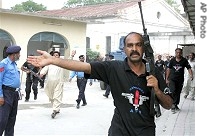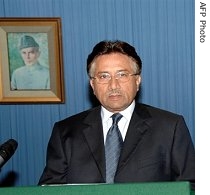2007年VOA标准英语-Analysts Say Pakistan Mosque Standoff Sets Stag
搜索关注在线英语听力室公众号:tingroom,领取免费英语资料大礼包。
(单词翻译)
By Benjamin SandIslamabad
13 July 2007
Pakistan's military operation against radical1 extremists in Islamabad's Red Mosque2 is now over, but fresh questions are being raised as security concerns rise. From Islamabad, VOA correspondent Benjamin Sand looks at the political impact the bloody3 siege has had on Pakistan's embattled president, Pervez Musharraf.
 |
| Pakistani commandos clear area as chief cleric of Islamabad's radical Red mosque Maulana Abdul Aziz arrives at Anti-Terrorist court in armored car in Rawalpindi, 12 Jul 2007 |
Major General Waheed Arshad briefed reporters while standing6 outside a room piled high with machine guns and rocket launchers and DVD's with titles like "To Jihad" and "Death to Spies".
"Seeing the arms and ammunition7, seeing the way the rooms are being used, the way this place was being used for militant training, I'm sure everybody is now clear this was not a benign8 madrassah which was only looking at education," he said.
| Smoke rises from Lal Masjid during heavy gunbattle between Pakistan troops and militants in Islamabad, 10 July 2007 |
Hard-line Islamist lawmakers accuse the government of covering up the real death toll10 from the siege, which ended Wednesday after the military stormed the mosque.
President Pervez Musharraf says 75 people inside the mosque were killed along with 10 soldiers. Militants and students from the mosque had holed up there more than a week ago after a clash with troops in front of the complex.
Critics say at least 400 people, perhaps as many as 1,000 people, were really killed, and their bodies buried in unmarked graves outside the capital.
The charges are impossible to verify, but since they have been widely reported, could damage the increasingly unpopular president.
Political analyst11 Shafqat Mahmood says the standoff has set the stage for a confrontation12 between the president and the country's religious hard-liners.
"Among the many fault lines in the country one sees most of these lines sharpening," he said.
The Red Mosque had long fostered Islamic militancy13. In recent months, its leaders had vowed14 to impose Islamic law on Islamabad, and its students had kidnapped police officers and women they accused of being prostitutes.
Among those killed was the mosque's most militant cleric, who had told journalists earlier he hoped his death would spark an Islamic revolution.
Militants are demanding revenge. On Friday, the government tightened15 security around mosques16 and public buildings, out of fears that protesters would take to the streets.
 |
| Pakistani President Pervez Musharraf addresses the nation on radio and Pakistan State Television in Islamabad, 12 Jul 2007, after the raid on Red Mosque |
However many moderates question his resolve. They note he has repeatedly threatened crackdowns against extremists in the past but stopped short of a sustained confrontation.
The standoff at the Red Mosque occurred after Mr. Musharraf had faced months of protests over his dismissal of the country's chief justice.
With elections expected later this year, political analysts18 say the president is perhaps more vulnerable now than ever before.
 收听单词发音
收听单词发音 




